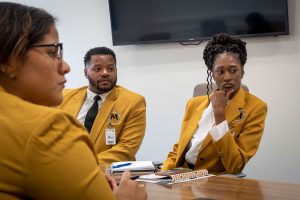These are some of the major programs and Minority Serving Institutions that minority students should have on their radars
As an educator, especially when the second semester approaches, I see my students grow more and more curious about what lies ahead for them.
“Miss Holbert, do I need to get a Masters in order to get my PhD?,” “Do I go to a four-year, or start at a community college then go to a four-year? “Miss Holbert, I have these colleges to choose from — can I get some help going through my options?”
Those are just to name a few of the anxiety filled, yet curiously excited questions my agriculture education students have — as I’m sure many of thousands of students share across the United States. Yet, these questions share with me more than the feelings behind them. They relay that our students care about their future, and care about their place within the progress of our nation, world, and its challenges. And the numbers don’t lie.
Related: Guide to Agricultural Colleges
Even in the face of continued (and even surging) COVID-19 concerns, college application submissions for the upcoming fall have increased from 14.63 million to 14.66 million college students. And with many institutions across the United States excluding standardized testing from the admission process, access to some of the country’s most elite programs has become more accessible to tens of thousands of more students from different walks of life and diverse backgrounds.
Because I am an educator — more specifically an agricultural educator — it is my hope that our agriculture driven programs at our higher education institutes continue to provide opportunities to equip students with the tools to be successful industry leaders, educators, and advocates for the agricultural industry. More specifically, my hope is that our higher education agricultural programs across the United States recognize their opportunity to empower minority students in agriculture to achieve academic and career success.

The National Institute of Food and Agriculture at the U.S. Department of Agriculture share that Minority Serving Institutions (MSIs) promote and provide agriculture programs and that academics aid in advancing cultural diversity in the food and agriculture workforce. MSIs also have the opportunity to strengthen the significance and importance of agriculture, the USDA, and private industries to underserved communities and their families.
For those students searching for that space where agriculture and representation meet, here are three minority-serving institutions whose agriculture programs are approaching excellence when providing access to equitable opportunities for their students.
North Carolina State, School of Agriculture and Life Sciences
The North Carolina State School of Agriculture and Life Sciences, located in Raleigh, is rooted in equity and inclusion of minority students in agriculture.
In 1979, The NC State School of Agriculture and Life Science participated in a program called Minority Research Apprenticeship, working alongside the USDA to link the educational opportunities in agriculture programs with minority high school students. Focusing predominately on agricultural sciences and engineering careers, the Minority Research Apprenticeship chose non-White students to work with researchers in hands-on field or laboratory experiences. As a result of this effort, it was hoped that the program can recruit minority students and cultivate their individual success.
At the conclusion of North Carolina State School of Agriculture and Life Sciences’ concerted effort to reach out to non-White students, they were able to document minority student’s personal feelings and perspectives about pursuing a career in agriculture. The results were generally positive and show me that schools such as the North Carolina State School of Agriculture Life Sciences have generationally and systemically cared for minority students in their programs, while also caring that their minority students develop skills to be a part of the biggest challenges in United States agriculture.
Today, NC State’s School of Agriculture and Life Sciences continues to prove their commitment to minority students and their future, being among the nation’s Top 10 universities graduating a large minority population in agriculture and life sciences. This is due, in part, to their focus on what the university leadership describes as “non-cognitive approaches,” meaning that they recognize students’ needs more than an intellectual space to grow, but a skill building and community building space to thrive as well.
By providing mentorship spaces through faculty and their Minorities in Agriculture, Natural Resources and Related Sciences (MANRRS) chapter, minority students have the opportunity to build an agriculture community and perspective among people who share similar cultural experiences. Minority students also have the opportunity to attend workshops featuring accomplished minorities involved in industry and sciences to learn tips and skills around professional development an academic success.
Showing that time-management skills, test-taking, and study skills are essential to a student’s holistic success in college, the college also provides a seminar called Freshman Advancement Seminar — a course exposing minority and first-generation college students to resources available to them while at the university.
Cornell University, College of Agriculture and Life Sciences
Cornell University’s College of Agriculture and Life Sciences (CALS) has the most diverse student body on their campus for the last 15 years. However, CALS shares on their college’s diversity and inclusion website that they know “more work needs to be done.”
In 1898 ,when the college hired its first woman professor, the college began its mission to hire faculty and staff from all walks of life in order to reflect a diverse student body, their needs, and cultural understandings.
“Diversity is necessary to continually build an equitable, welcoming, and thriving community at Cornell CALS,” the school says.
After an analysis of their colleges needs and responsibilities through Cornell Universities Office of Diversity and Inclusion, the Faculty Committee on Diversity and Inclusion, and the Office of Academic Programs, CALS is now focusing on the following initiatives:
- Increase recruitment and improve retention of Native American and Indigenous across all levels (ex: undergraduates, transfers, and graduate students) through offering studies on their culture and sponsoring student residence and life that celebrate the North American Indigenous cultures and heritage.
- Expand internship opportunities designed to help students from different backgrounds and ethnicities through expanding enrichment programs, bridging the gaps between high school and college experiences.
And similarly to the NC State School of Agriculture and Life Sciences, CALS has launched a new Peer Mentoring Program to encourage and support underrepresented minorities and first-generation students. This program starts over the summer, where students are assessed, paired with mentors with similar experiences and backgrounds, and mentored through the fall semester. This program focuses specifically on experiential and transitional mentoring into college, supplementing academic mentoring.
To support academics, students are not only mentored, but so are faculty-engaging in professional development seminars to stay up to date on their cultural competency, brush up on inclusive teaching, and gain tips on supporting students.
University of California Davis, Department of Viticulture and Enology
UC Davis is one of the world’s most top ranked research institutes. Known for their world leading advancements in medicine and agriculture, UC Davis is also known for making systemic and influential steps to ensure their school leadership and advisory reflects the culture and experiences of their students and faculty.
October 2021 opened an opportunity for UC Davis’s Department of Viticulture and Enology to expand its inclusivity to diverse representation in its executive leadership board by welcoming more minority members to the 26-member board.
Their new leadership includes NBA legend and wine entrepreneur Dwayne Wade, who owns and operates Wade Cellars, Black Wine Professionals founder Julia Coney, and UC Davis Alumnus Miguel Luna, a partner with Silverado Farming Company and partner/founder of La Pelle Wines. UC Davis professor and chair of the viticulture and enology department, David Block, shared with UC Davis Media that the three additions to the executive leadership board bring “a passion for diversifying the industry and making sure students receive a great education and fulfilling career” as well as a passion for wine and research.
These strides in representation not only offer underrepresented students in the viticulture and enology industry folks to look up to and a more equitable program as their newly installed representatives will offer a perspective that represents those students, their interests, and potential needs — one that has the opportunity to transform curricula and policy to best fit underrepresented student needs.
This advancement in representation appeared after the result of previous initiatives. In 2012, the department introduced a project called Broadening Horizons, with the goal of increasing the percentage of underrepresented people pursuing careers in the wine and grape industry. As a result of this project and its initiatives, the number of underrepresented students has more than risen from less than 10 percent to more than 25 percent.
Honorable Mentions
Of course, there are more than three higher-education agriculture programs across the nation that are putting in the work to provide inclusive and equitable experiences for their students.
The following are a few honorable mentions that I found as I was researching these schools. These schools mentioned are either MSIs doing this work, or they are not yet MSIs that are also doing this work to provide equitable opportunities for minority students. If interested, feel free scroll through their websites and get to know their agriculture programs and equity strategies for minority students in agriculture on a personal level.
Good luck to our agriculture education students as they make big and influential steps toward a prolific future!
Bre Holbert is a past National FFA President and studies agriculture science and education at California State-Chico. “Two ears to listen is better than one mouth to speak. Two ears allow us to affirm more people, rather than letting our mouth loose to damage people’s story by speaking on behalf of others.”



